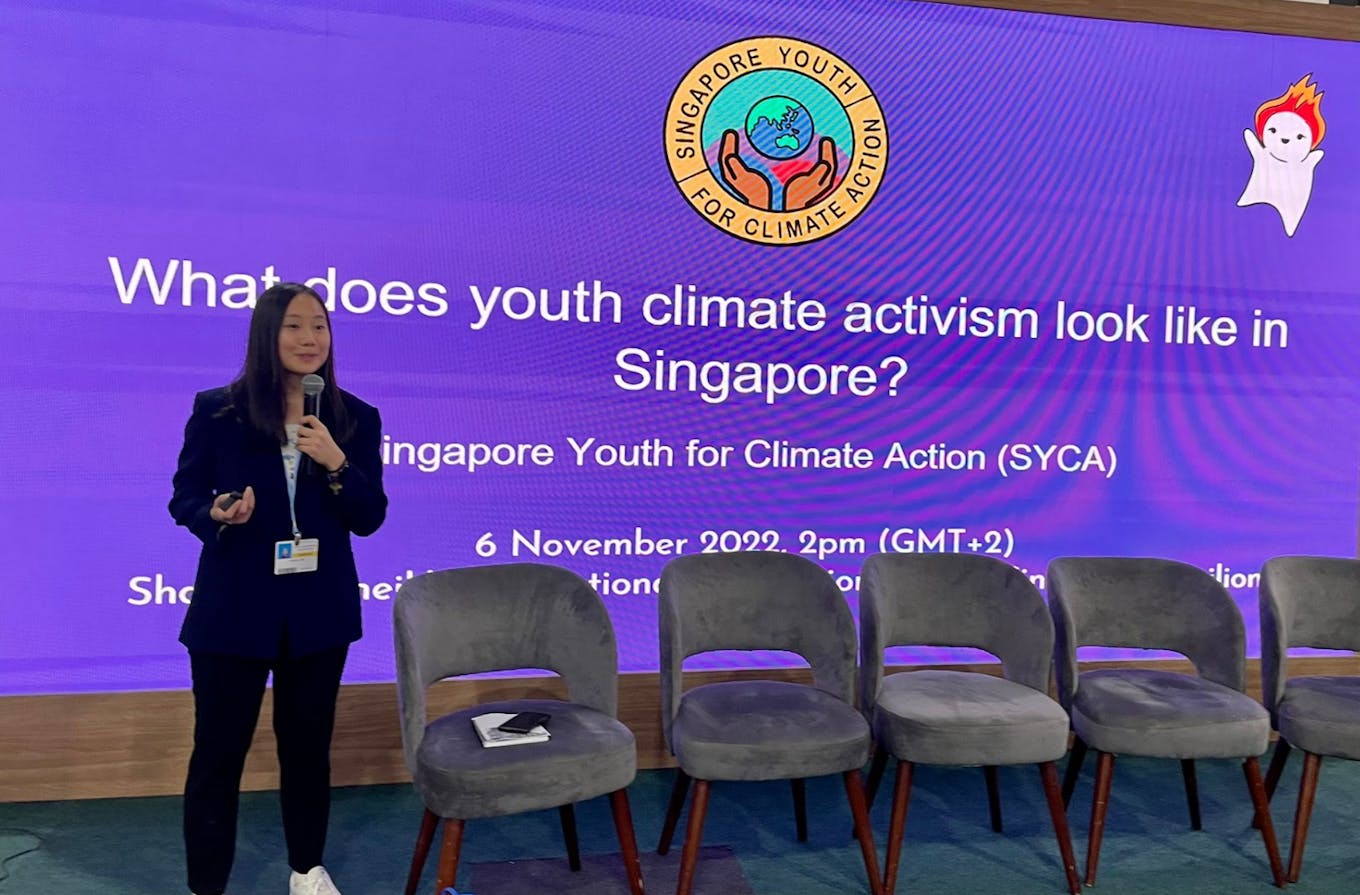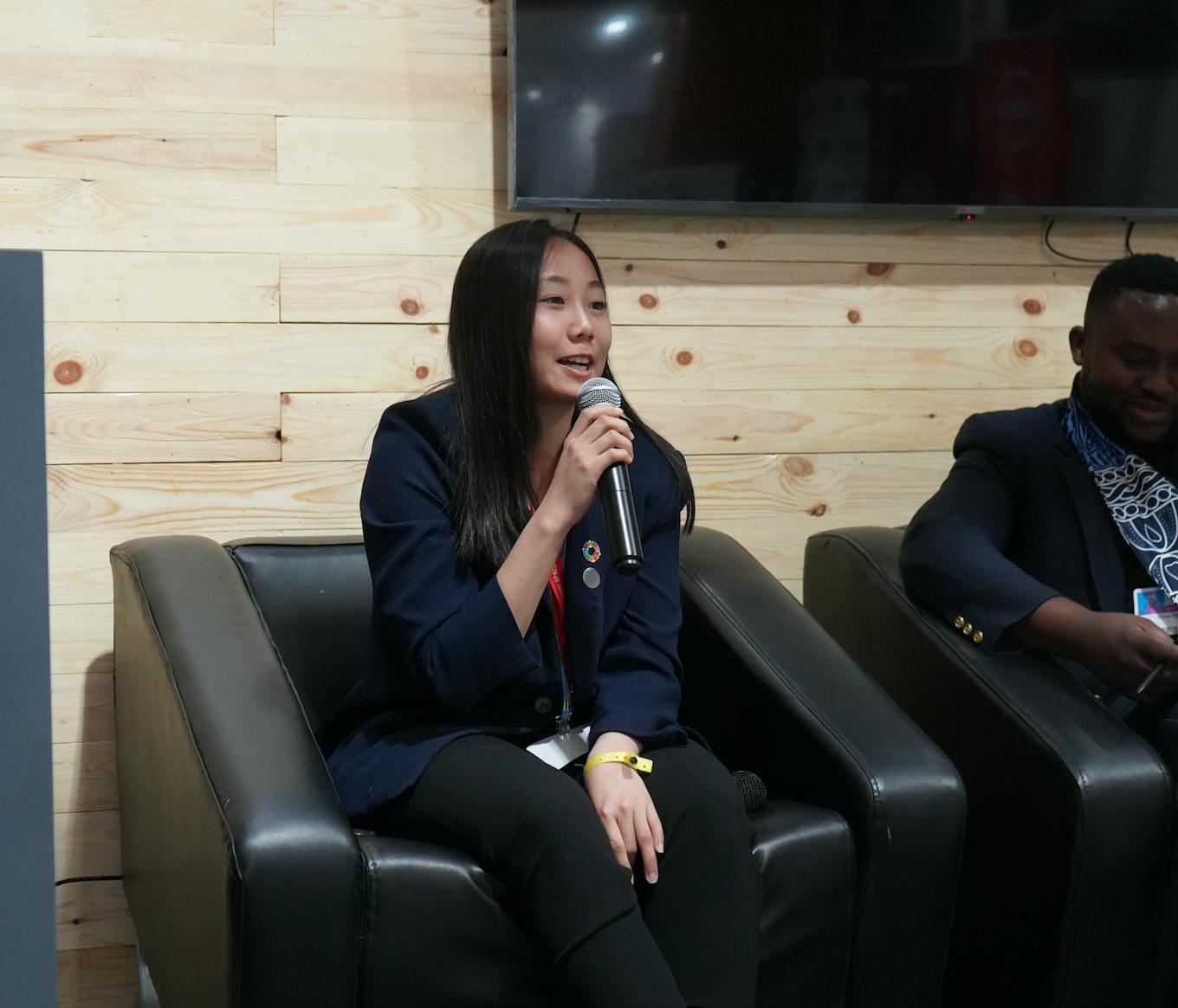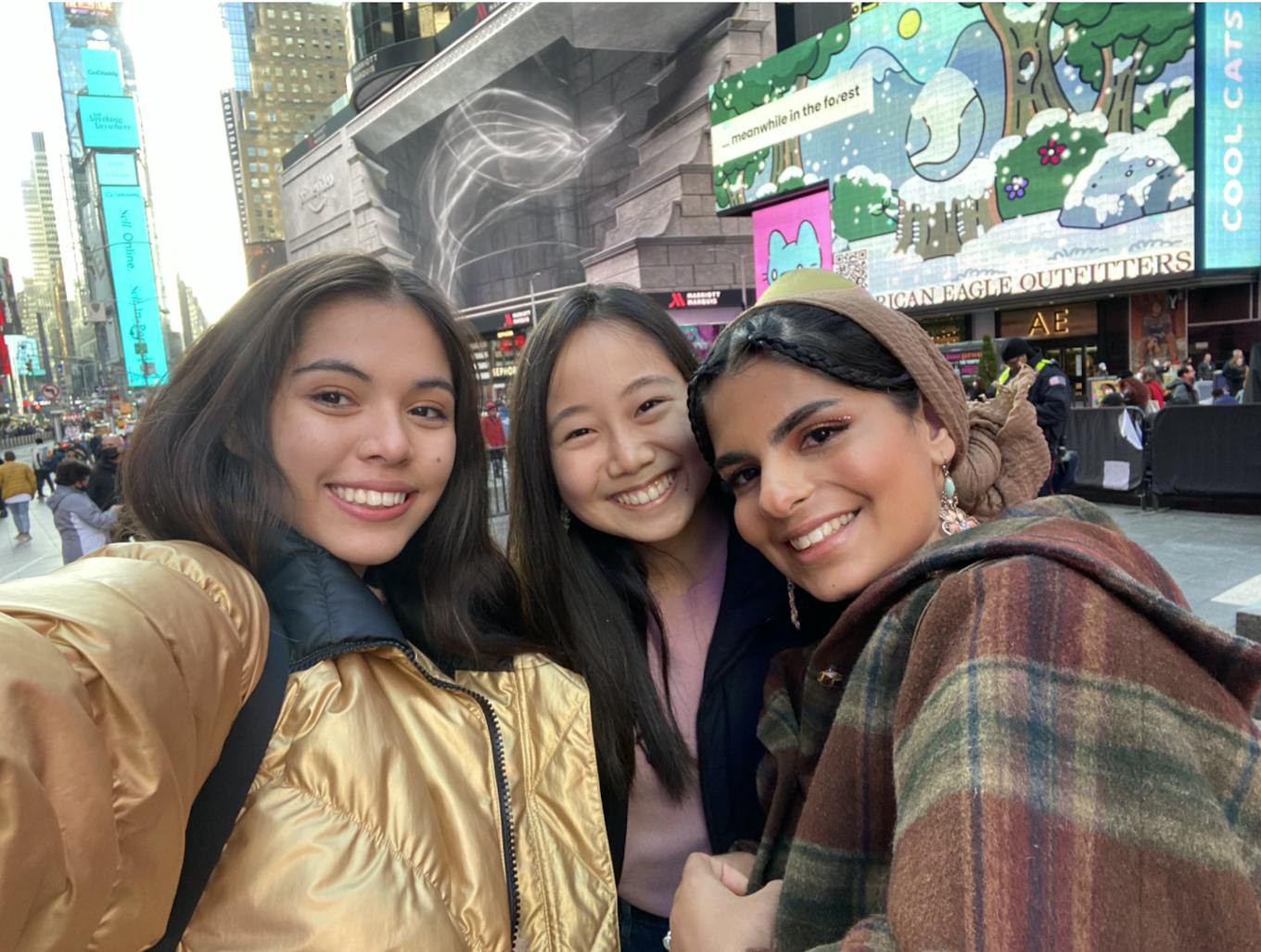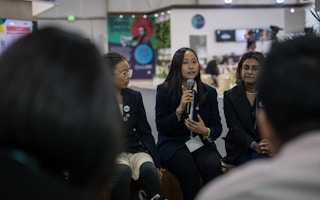In Singapore, activists walk a fine line. Just the word “activist” arouses a certain degree of discomfort. Activists are rarely seen as benevolent agitators for a better future. They are regarded as troublemakers.
To continue reading, subscribe to Eco‑Business.
There's something for everyone. We offer a range of subscription plans.
- Access our stories and receive our Insights Weekly newsletter with the free EB Member plan.
- Unlock unlimited access to our content and archive with EB Circle.
- Publish your content with EB Premium.
Kate Yeo is a Singaporean climate campaigner who is instinctively aware of all the sensitivities of engaging in activism in the conservative state. She also has a good grasp of how to push for change within the boundaries of acceptability.
She knows how to walk the line – engage with Singaporean policymakers while carefully navigating what are known locally as “OB (out-of-bounds) markers”, the unwritten rules for what can and cannot be said.
The Just Stop Oil campaign in the United Kingdom, which saw young British women douse a Van Gogh painting with soup to raise awareness of fossil fuel dependence, would not and could not ever happen in a country like Singapore, Yeo says.
There would be a huge backlash, not just from the authorities, but from the Singaporean public who would turn against the environmental movement, she believes.
“
There’s always this invisible boundary for what you can and cannot say in Singapore. You cannot be an activist and not put yourself at risk. That’s the job.
Kate Yeo, climate advocate, Singapore Youth for Climate Action
“Even as we try to push the boundaries, we also have to be responsible about it,” said the 21 year-old, who wasn’t particularly interested in environmental issues until 2018, when she became inspired by the likes of Greta Thunberg.
The issue that moves her the most is climate justice, which partly comes from her acknowledgement of a privileged background.
Coming from a relatively affluent family, Yeo says she has always been very aware of how lucky she is. As a younger person, she volunteered at food banks, distributing food to the less fortunate.
“That’s why activism is so important to me, because I have benefited from good resources and I want to be able to pass it on – whether it’s making sustainability more accessible or mentoring another young changemaker.”
Over time, Yeo has learned about the broader issue of environmental justice, and how climate intersects with social inequality.
While campaigning for stronger climate action in Singapore – a global oil hub that has received international criticism for climate inaction – she is acutely aware of the impact that bolder policies, such as a higher carbon tax, will impact lower-income families.
“I need to be highly aware of who’s going to be impacted most by what I’m advocating for,” she said.
Yeo was part of the Singapore youth delegation at the COP27 climate talks in Egypt in November, as a core member of the advocacy group Singapore Youth for Climate Action (SYCA).
Her work writing environmental policy recommendations, organising policy workshops to help young people better understand environmental legislation and representing Singapore at COP27 helped Yeo earn a place in the 2022 Eco-Business Youth A-List, which recognises the young people doing the most to push for environmental and social issues.
Also last year, Yeo attended the United Nations Stockholm +50, an international climate meeting convened by the UN General Assembly in Sweden as a youth delegate. She contributed to the S+50 Global Youth Policy Paper, which among its demands called on governments to introduce large-scale environmental destruction – known as ecocide (which Yeo has documented in an explainer for Eco-Business) – as a crime in the Rome Statute of the International Criminal Court.
Much of Yeo’s advocacy work has been built on her communication skills. She broke down what the negotiations on carbon markets and loss and damage at COP27 meant in the form of explainers on her popular Instagram account, which has given her a platform to push for change.
Yeo made a name for herself as founder of Bring Your Own Bottle Singapore, a movement to encourage the phase-out of single-use plastic cups and bottles in the city-state, where plastic consumption is rampant and the recycling rate is notoriously low for a wealthy nation.
Starting off with bubble tea shops, Yeo persuaded retailers to offer discounts to customers who brought their own containers. She moved on to hawker stalls and coffee shops, nudging some 300 outlets to reduce their plastic waste.
After finding an audience concerned about plastic waste, Yeo used her Instagram account to talk about other environmental issues, including the topic closest to her heart – climate justice.
In this interview, Yeo talks about activism and privilege in Singapore, how she deals with climate anxiety and the perils of youth-washing.
Is activism a privilege for the middle classes?
I think to a huge extent activism is a very privileged thing to do. You have to have a certain form of education and the bandwidth to do it. I’m not sure people working shifts all day and night would have the time to be an activist. I’m very cognisant of that. I see that my role is to empower and uplift people’s stories and voices.

Kate Yeo introducing a panel discussion at the COP27 climate talks in November. Issue: Kate Yeo
You’re an activist in Singapore – not the easiest of countries for activists. How do you do what you do?
I could talk about the challenges [of being an activist in Singapore] all day! There’s always this invisible boundary for what you can and cannot say in Singapore. One of my biggest challenges is trying to push that boundary without putting myself at risk. But the thing is, you can’t be an activist and not put yourself at risk. That’s part of the job.
Making sure that I’m very factual in what I say while being able to speak up about what other people may be afraid to say has been one of the biggest lessons I’ve learnt.
For example, at COP27, Singapore only supported a phase-down of coal, instead of supporting a phase-down of all fossil fuels. And that’s because I think we’re so reliant on natural gas [which provides about 97 per cent of the city-state’s energy].
We [Singapore] couldn’t support [the phase-down] of all fossil fuels. But they’ve never said it explicitly. I wanted to write a post about that. But I thought, would they POFMA me? [POFMA, or the Protection from Online Falsehoods and Manipulation Act, was introduced in 2019 by the Singapore government to “help protect the Singapore public against online harm by countering the proliferation of online falsehoods”, otherwise known as the “fake news law”].
So it’s always at the back of my mind that everything I say has to be so precise and accurate.
Another challenge is that in Singapore, especially in the past year, the cost of living and inflation has been a huge issue. So as an environmentalist, I have to be careful when I comment on the government increasing the carbon tax. The carbon tax can hurt lower-income families the most. So I need to be highly aware of who’s going to be impacted most by what I’m advocating for.
How does activism differ in Singapore?
Take the Just Stop Oil movement in the United Kingdom, which has been throwing soup on paintings [the climate activists demonstrated against Big Oil by dousing Van Gogh’s ‘Sunflowers’ with Heinz tomato soup in 2022]. That would never work in Singapore. It would backlash against you and turn the public against the environmental movement. Even as we try and push the boundaries, we also have to be responsible about it. People’s lives are at stake. While advocating for a higher carbon tax, we have to think about how that affects lower-income families who are already facing a high energy cost burden. These are the people we have to look out for.
How much do you worry about being co-opted by the powers that be and “youth-washed”?
In Singapore, you have to work with the government to an extent. In 2022, while working with the Singapore Youth for Climate Action, we were able to attend closed-door consultations and speak openly with policymakers. At COP27, we would talk to the negotiators and people from the Ministry of Sustainability and the Environment [Singapore’s environment ministry] or the National Climate Change Secretariat, and were able to have very honest conversations with them and talk about the constraints they feel they’re working with.
But the issue of youth-washing and co-opting is a very real one. Because once you build these relationships with these people, you’re more wary about what you say. If I critique what they’re doing, how are they going to perceive me? How is that going to affect our working relationship going forward? That’s a very difficult line to toe. If you do something that’s too confrontational in Singapore, the government paints a certain narrative of you. And it’s not just the government – other Singaporeans also internalise that image.
At COP27, I had two friends from SYCA who were assigned government badges. I chose to go on an NGO [non-governmental organisation] badge because I didn’t want that affiliation and wanted a bit more independence. I wanted to be able to take part in the protests and network freely with other activists, whereas my other two friends were more careful because they were on a government badge.
Did you feel that you were taken seriously, that you were on equal footing while at COP?
It depends on the individual [policymaker]. Some were definitely talking down to us, and said “you guys will understand when you’re older, you have to learn the economics of it all”. But there were also people who were very patient with us and took the time to understand our concerns, and tried to explain their position. And those were always conversations that I appreciated a lot.

Kate Yeo speaking at an event on climate change. Image: Kate Yeo
What are the sort of things that give you hope that your activism has been worth it?
For me, it’s always the community and the people I meet. When attending conferences like COP, there are a lot of men wearing suits and carrying briefcases going into rooms making decisions for you. But there are also many other youth activists, indigenous communities, who are outside those rooms working so hard to try and build a better world. Being able to meet these people and build relationships with them has been a huge part of my journey.
Activism can be depressing. You really need like-minded people to support you. After COP27, I wrote a blog post titled “The system is broken”. I was sitting in negotiation rooms and seeing all these leaders go back and forth over a single line of text. For hours. It felt like there was no sense of urgency. Meanwhile, there were people outside these rooms who were talking about how their communities are literally dying from floods or pollution.
Being at these international conferences has really opened my eyes to how multilateral processes are all about incremental change. It’s one commitment at a time. There are so many countries with so many different interests, that that’s all they can manage. But the climate is not going to wait for incremental change. That’s always the biggest struggle I have.
However, some things do give me hope. At COP27 last year, young people were able to be part of Singapore’s delegation on government badges. Someone who’s been to COP events before said that five to 10 years ago, she would never have foreseen that youths would be part of the official delegation. That’s actually pretty crazy and gives me hope for the future.
Also seeing how in Parliament, sustainability is becoming mainstream. They talk about it in almost every Parliament sitting. And they’re not just talking about like plastic bags anymore. A whole host of climate issues, from carbon tax to carbon credits, are being discussed. That’s a big shift that I just saw in the last few years.
So what will drive genuine climate action?
To focus on what can be done locally. There are so many environmental issues Singapore contributes to as a country, even though we’re constantly told that we are a small nation. Singapore has the world’s highest biocapacity deficit [the country’s ecological footprint versus its natural resources capacity] – at 10,300 per cent. Singapore also has one of the world’s largest deforestation footprints per capita and is the largest importer of sand. But because of its regional clout, there’s so much potential in what Singapore can do as a country.
For instance, Singapore is a big trader in bunker fuel for shipping, so we have the potential to transform the shipping industry towards greener fuels. The same goes for oil trading, electric vehicles, green finance and even carbon credits. Because of its financial muscle and regional influence, Singapore could drive a lot of change in the region.
“
It helps if you can channel climate anxiety into something actionable. This is a big reason of why I still continue to do activism. It’s harder to just sit back and watch.
And activism has worked in Singapore. While we can’t all take to the streets and protest, the movement to save Dover Forest [a 33-hectare patch of forest that was zoned for development in 2021] showed that if Singaporeans come together effectively, the government can sometimes change its mind [some of Dover Forest will now be left untouched, some will be developed for public housing]. No movement in history has ever succeeded without mass mobilisation.
Who are your role models?
Xiye Bastida [a Mexican climate activist and member of the Indigenous Otomi community] and Ayisha Siddiqa [a Pakistani-American climate justice advocate, who is co-founder of Fossil Free University and Polluters Out groups]. They speak with a lot of clarity, conviction and confidence. They’re not afraid to voice out how they feel. And that’s something I always admire: not holding back. If you have something to say, just say it.

Climate activists Xiye Bastida (left), Kate Yeo (middle) and Ayisha Siddiqa. Image: Kate Yeo
What gives you confidence to be an activist, which as you mentioned is not easy in a country like Singapore?
I’m very much an introvert. In personality tests, I’m more than 90 per cent introverted. But climate justice and climate change have just become so existential to me. It’s not a side hustle anymore. It’s really something I feel every day, in every fibre of my being. It’s like I don’t have a choice. You have to talk about it – because other people are not.
How do you deal with climate anxiety?
It’s really about being part of a community. I talk to my activist friends a lot. We’re able to be very honest with each other about how we feel. Some days are more overwhelming than others. It helps if you can channel climate anxiety into something actionable. This is a big reason of why I still continue to do activism. It’s harder to just sit back and watch.
Do you have any advice for young activists?
The first thing is to get plugged into a community, because it’s a very hard role to do alone. Secondly, when you dare to say something, you also give permission for others to speak up. Because, trust me, a lot of people share the same views as you but are just afraid to air them. By speaking out, you break the culture of self-censorship. Our role is not just as environmentalists, it’s a broader cause to expand civil society in Singapore.
The interview has been edited for brevity and clarity.
Kate Yeo was one of 10 young sustainability leaders selected for the Eco-Business Youth A-List 2022. Read our stories with the other winners here.














